Background and Purpose: We developed a new digital cognitive assessment called Seoul Cognitive Status Test (SCST), formerly called Inbrain Cognitive Screening Test. The purpose of this study was to validate the clinical utility of the SCST by comparin...
http://chineseinput.net/에서 pinyin(병음)방식으로 중국어를 변환할 수 있습니다.
변환된 중국어를 복사하여 사용하시면 됩니다.
- 中文 을 입력하시려면 zhongwen을 입력하시고 space를누르시면됩니다.
- 北京 을 입력하시려면 beijing을 입력하시고 space를 누르시면 됩니다.

Discriminative Power of Seoul Cognitive Status Test in Differentiating Subjective Cognitive Decline, Amnestic Mild Cognitive Impairment, and Dementia Based on CERAD-K Standards
한글로보기https://www.riss.kr/link?id=A109245986
- 저자
- 발행기관
- 학술지명
- 권호사항
-
발행연도
2024
-
작성언어
English
- 주제어
-
등재정보
KCI등재
-
자료형태
학술저널
- 발행기관 URL
-
수록면
136-145(10쪽)
- DOI식별코드
- 제공처
-
0
상세조회 -
0
다운로드
부가정보
다국어 초록 (Multilingual Abstract)
Background and Purpose: We developed a new digital cognitive assessment called Seoul Cognitive Status Test (SCST), formerly called Inbrain Cognitive Screening Test. The purpose of this study was to validate the clinical utility of the SCST by comparing its scores of those with subjective cognitive decline (SCD), amnestic mild cognitive impairment (aMCI), and dementia diagnosed by the Korean version of the Consortium to Establish a Registry for Alzheimer's Disease Assessment Packet (CERAD-K). Methods: All participants (n=296) who completed the CERAD-K, SCST, and Instrumental Activities of Daily Living tests were included in this study. Total score, cognitive domain scores, and subtest scores of the SCST were compared among the 3 groups (SCD, aMCI, and dementia). Additionally, correlations between SCST and CERAD-K subtests were examined. Results: Cognitive domain scores and total score of the SCST showed significant differences among the three groups, with scores being the highest in the order of SCD, aMCI, and dementia (p<0.001). Most subtests of the SCST also showed higher scores in the order of SCD, aMCI, and dementia (p<0.001). However, SCD and aMCI groups showed no significant differences in scores of the Phonemic Word Fluency Test (p=0.083) or Korean Trail Making Test-Elderly version Part A (p=0.434). Additionally, there was no significant difference in the score of Place Recognition (p=0.274) of the Word-Place Association Test between aMCI and dementia groups. Conclusions: In conclusion, differences in total score, cognitive domain scores, and subtest scores of the SCST among the 3 groups of participants diagnosed using CERAD-K confirm the clinical utility of the SCST for cognitive assessment.
동일학술지(권/호) 다른 논문
-
- Korean Dementia Association
- Chaejin Lee
- 2024
- KCI등재
-
A Comparison of Item Characteristics and Test Information Between the K-MMSE~2:SV and K-MMSE
- Korean Dementia Association
- Jihyang Kim
- 2024
- KCI등재
-
Speech Emotion Recognition in People at High Risk of Dementia
- Korean Dementia Association
- Dongseon Kim
- 2024
- KCI등재
-
Assessing the Impact of Defacing Algorithms on Brain Volumetry Accuracy in MRI Analyses
- Korean Dementia Association
- Dong-Woo Ryu
- 2024
- KCI등재




 ScienceON
ScienceON






